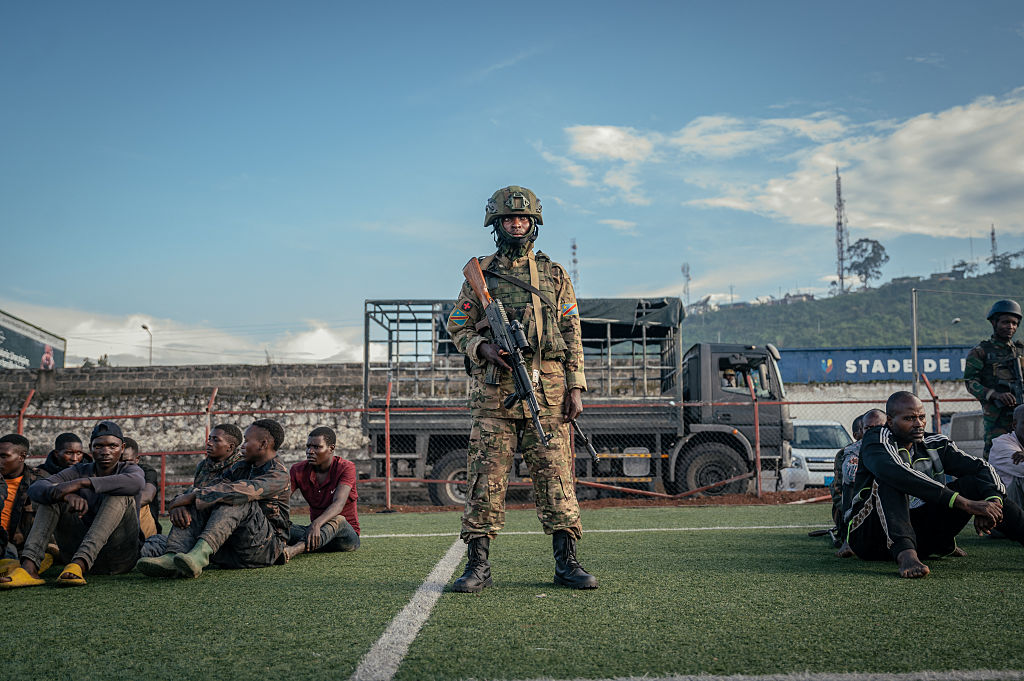Months after M23 rebels launched an offensive and seized the two largest cities in eastern Democratic Republic of the Congo, eyewitnesses, the United Nations and human rights groups are accusing the militants of a host of possible war crimes.
M23’s efforts to consolidate control of Goma, the capital of North Kivu province, included the executions of at least 21 civilians, according to nongovernmental organization Human Rights Watch (HRW). The group said it received credible reports of dozens of more killings.
“The M23’s brutal control over Goma has created a climate of fear among those perceived to be allied to the Congolese government,” HRW Senior Great Lakes Researcher Clémentine de Montjoye said in a statement. “The mass killings don’t seem to be actions by rogue fighters, but rather the M23 leadership’s efforts to solidify their control by whatever means necessary.”
Three pickup trucks carrying dozens of M23 fighters arrived at various parts of Goma’s Kasika neighborhood on February 22, witnesses said. Their target was Katindo military camp, a former army barracks. Some of the Soldiers and their families still lived nearby.
“Not all the Soldiers were able to run away,” a local told the BBC. “Some threw away their guns and stayed about the neighborhood.”
There had been reports of crime and activity by the Congolese Army (FARDC) as well as the “Wazalendo,” independent local militia groups aligned with the government.
“They started shooting and took around 25 people from the streets,” a resident of the area told HRW.
Witnesses said the militants executed seven people near Katindo. Eleven more bodies, including that of a boy, were found at a construction site less than 100 meters from the camp. Residents said they saw more than a dozen bodies on Kasika Avenue.
“[M23] showed me the bodies of people on the ground and said: ‘This is what we’re going to do with you,’” a woman told HRW. “I saw 18 bodies. Others were on other streets.”
On February 23, M23 fighters rounded up people, including to forcibly recruit them, and killed three men as they tried to escape.
“Commanders and combatants who directly ordered or carried out abuses should be held criminally accountable,” HRW said in its June 3 report.
Other organizations have reported M23 crimes committed since the offensive began in January.
Amnesty International in May said rebels killed, tortured and forcibly disappeared detainees, held some as hostages, and subjected them to inhumane conditions at detention sites in Goma and Bukavu, the M23-held capital of South Kivu province.
“M23’s public statements about bringing order to eastern DRC mask their horrific treatment of detainees,” Tigere Chagutah, the rights group’s regional director for East and Southern Africa, said in a statement. “They brutally punish those who they believe oppose them and intimidate others, so no one dares to challenge them.”
Another Amnesty International report in March said M23 fighters raided hospitals in Goma looking for wounded Congolese Soldiers and took 130 people, including caregivers. Many were tortured, and some are missing still.
UNICEF, the U.N. agency for children, reported that the number of rape cases treated across 42 health centers in eastern DRC increased by five times in February, describing it as the worst sexual violence in years. Nearly a third of the victims were children, the agency said. In one instance, a mother said that armed men searching for food raped her six daughters, including her youngest, who was 12 years old.
Experts say M23 likely will continue to face challenges in Goma, as it lacks the enforcement capacity to secure large cities.
“Goma and its peripheral areas have faced persistent insecurity since M23 captured [it],” two analysts wrote in the May 29 edition of the Critical Threats Project’s Africa File. “Large numbers of Wazalendo fighters and FARDC troops blended into the population in Goma in January and contributed to spikes in violent crime after M23 captured the city.”
Locals describe a state of near lawlessness in city centers, as gangs of armed men, some who escaped from local prisons, prey on civilians using weapons left behind by the army.
“Before, there was bad governance, but we were free,” a young Goma resident told the BBC. “There was embezzlement. There was mismanagement and we spoke out about that. We had the chance to go to court. Today, there is bad governance, but we live in terror and silence.”

